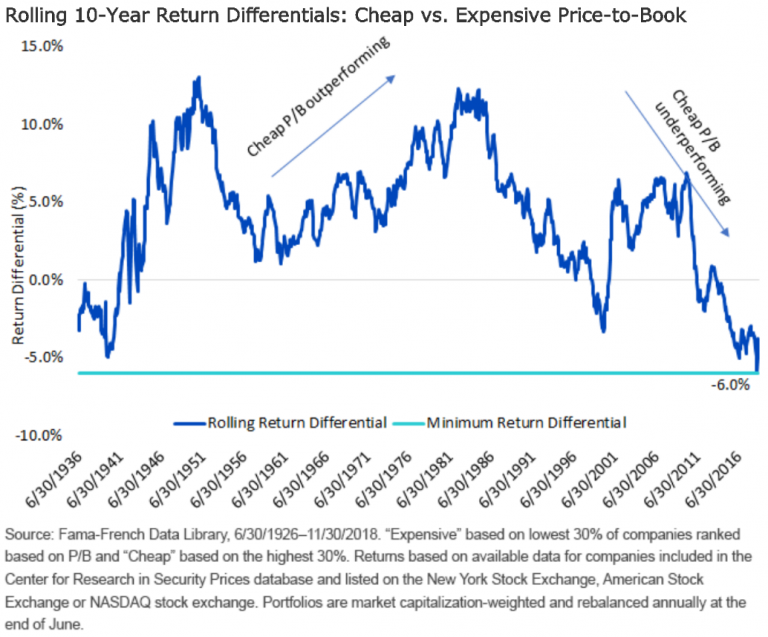An article on the WisdomTree blog reports that the decade ending September 2018 was the “single worst decade in history” for price-book as a factor-sort of the market and asks, “Is value dead? Or do enthusiasts of the Russell Index family and the Fama-French Factor Model need to re-evaluate price-to-book ratio (P/B) as the primary metric used in defining value stocks?”
 The article cites comments by Fama-French in their seminal paper on factors: “there is no evidence that its explanatory power deteriorates through time,” but notes that cheaper stocks have outperformed expensive stocks in 616 of the 679, 10-year periods from 1926 through the end of 1992. Further, it states, recent returns have shown a down-trend, with “the recent single worst decade for low-P/B stocks compared to high-P/B stocks.”
The article cites comments by Fama-French in their seminal paper on factors: “there is no evidence that its explanatory power deteriorates through time,” but notes that cheaper stocks have outperformed expensive stocks in 616 of the 679, 10-year periods from 1926 through the end of 1992. Further, it states, recent returns have shown a down-trend, with “the recent single worst decade for low-P/B stocks compared to high-P/B stocks.”According to the article, sector tilts are the culprit for value’s lagging performance. “P/B sorting of the market as a value strategy results in chronic sector tilts”– namely, toward financial stocks and away from tech.

“A number of market commentators believe the epic run of outperformance by growth stocks will end and that value is destined to turn around,” the article says, but suggests that while this may be the case, “clearly the most important ingredient for that turn would be Financials outperforming Technology. How confident are you in that outcome?”
For investors looking for continued upside in U.S. equities over international equities, the Direxion FTSE Russell US Over International ETF (NYSEArca: RWUI) offers them the ability to benefit not only from domestic U.S. markets potentially performing well, but from their outperformance compared to international markets.
Conversely, if investors believe that international markets will outperform U.S. domestic markets, the Direxion FTSE International Over US ETF (NYSEArca: RWIU) provides a means to not only see international markets perform well, but a way to capitalize on their outperformance compared to the U.S. markets.
For more market trends, visit ETF Trends.

